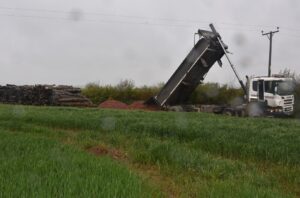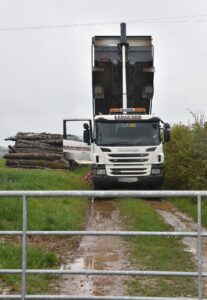Farm fined after dad electrocuted
A farm has been fined £60,000 following the death of a father-of-three who was electrocuted by an overhead power line.
Patrick ‘Paddy’ Rice was fatally electrocuted on 13 May 2021 while operating a tipper lorry at VB Farms LLP’s Littlecombe Farm in Crediton, Devon.
Paddy’s mother says her family have been “traumatised and deeply shocked” since the 43-year-old lost his life.
Employed by Langford Plant Hire, Paddy, who was from Crediton, was delivering stone that was going to be used to repair farm tracks by VB Farms LLP, when the hydraulic arm of the tipper lorry came into contact with an 11kV overhead power line.

He was electrocuted after exiting the lorry.
A Health and Safety Executive (HSE) investigation into the incident found VB Farms LLP failed to carry out an assessment of how the work could be completed safely and did not consider the dangers involved with working near an overhead power line.
Overhead power lines typically carry electricity at voltages similar to the 11 kV in this case, but can go up to 400 kV. Britain’s workplace regulator is also concerned about a nationwide trend of farm machinery getting bigger, increasing the risk of contact with power lines. HSE guidance can be found at: Overhead power lines – Electrical safety (hse.gov.uk)
Fran Rice, Paddy’s mother, said in a statement presented to the court: “Paddy was an extremely practical person. He had loads of friends and was very popular and liked adventures.
“Since the loss of Paddy, we are all traumatised and deeply shocked. It has all been hazy. We find it difficult to talk about what happened, Gordon, Paddy’s dad, does not talk a lot about it. We are living in a life that is carrying on and ours isn’t, we are not fitting in, we go out and want to enjoy what we do but it is never quite there.”

Michele Webber, Paddy’s partner, said in her victim personal statement: “When the accident happened, I was off work for about five months. My memory is terrible since it happened and I am stuck on the day of the accident. I feel like I have no purpose or joy and no future.”
VB Farms LLP, of Love Street, Chester, was found guilty of breaching Regulations 3(1) and 4(3) of the Electricity at Work Regulations 1989 following a trial at Exeter Magistrates’ Court. The company was fined £60,000 and ordered to pay costs of £11,715 on 17 August 2023.
HSE inspector James Collins said: “This was a tragic and wholly avoidable incident – another sad reminder of the dangers of overhead powerlines. Paddy’s death could easily have been prevented if VB Farms LLP had acted to manage the risks involved and put in place a safe system of work.”
This prosecution was supported by HSE enforcement lawyer Jon Mack.
Notes to Editors:
- The Health and Safety Executive (HSE) is Britain’s national regulator for workplace health and safety. We prevent work-related death, injury and ill health through regulatory actions that range from influencing behaviours across whole industry sectors through to targeted interventions on individual businesses. These activities are supported by globally recognised scientific expertise. hse.gov.uk
- More about the legislation referred to in this case can be found at: legislation.gov.uk/
- HSE news releases are available at http://press.hse.gov.uk


